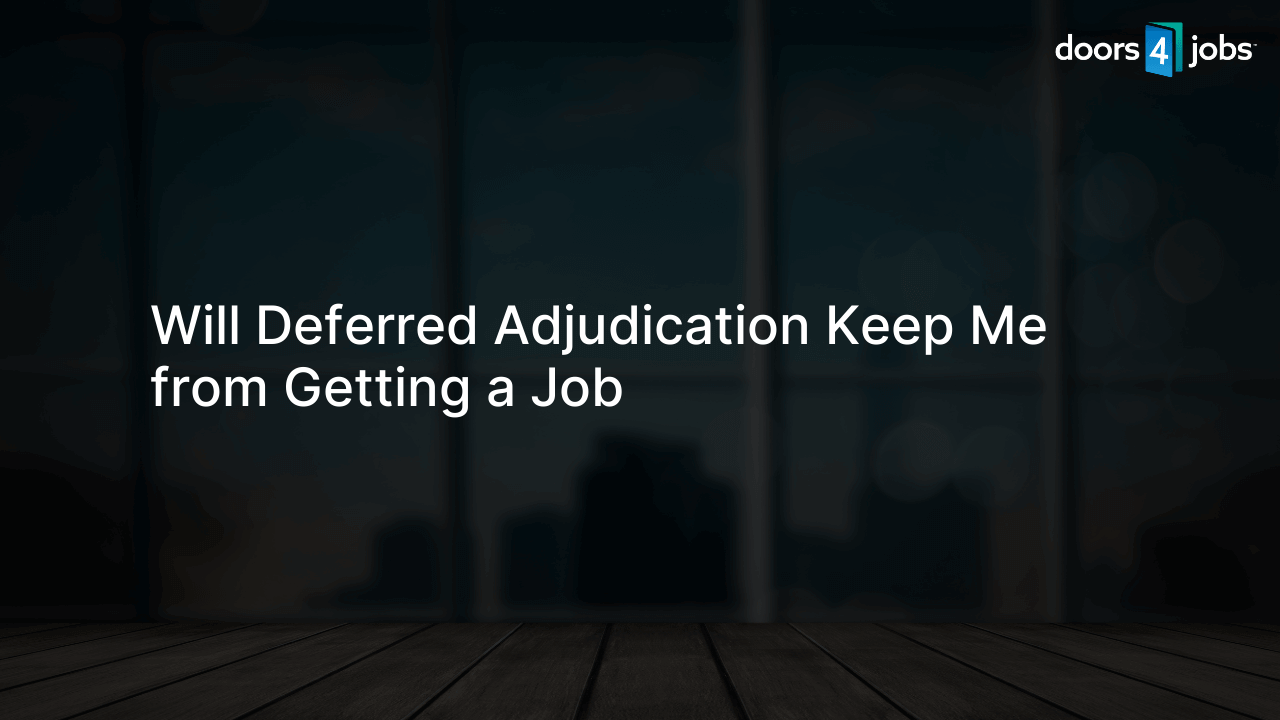Deferred Adjudication may not necessarily prevent you from getting a job; however, it might still show up on background checks, depending on the jurisdiction and nature of the offense. Employers might consider it on a case-by-case basis, depending on the relevance of the offense to the job you are applying for.
Understanding Deferred Adjudication
Deferred adjudication is a legal process that allows individuals accused of a crime to accept a probationary period instead of a formal conviction. If the individual completes the probation period successfully, their charges may be dismissed.
Deferred Adjudication and Background Checks
While deferred adjudication may not result in a formal conviction, it may still appear on background checks. In some jurisdictions, records of deferred adjudication are considered public, allowing prospective employers to access this information when conducting background checks on job applicants.
Expungement or Sealing of Records
Some states may allow individuals who have completed deferred adjudication to apply for expungement or sealing of their records. If successful, the record will not show up on most background checks, increasing the likelihood of securing job opportunities.
Employer Discretion
Employers have the discretion to consider applicants with deferred adjudication on a case-by-case basis. Factors that may influence an employer’s decision include:
- The nature and severity of the offense
- The relevance of the offense to the job in question
- The time that has passed since the offense occurred
Disclosing Deferred Adjudication
Honesty is essential when applying for jobs. If a prospective employer asks about your criminal history, disclose any deferred adjudication. You may explain the circumstances of your case and highlight the positive steps you’ve taken since completing the probationary period.
Know Your Rights
Understand the laws regarding criminal records in your jurisdiction, as protections against discrimination vary between locations. Some states and municipalities have enacted “Ban the Box” legislation, preventing employers from inquiring about criminal history during the initial stages of the hiring process.
Preparing for Job Interviews
When seeking employment with a deferred adjudication record, preparation is key to presenting yourself confidently in interviews. Be ready to discuss the positive steps you have taken following the probationary period, such as engaging in volunteer work, pursuing an education, or attending courses that improve your skills.
Emphasize Your Skills and Qualifications
Focus on your strengths, qualifications, and work experiences that demonstrate your suitability for the position. By highlighting your accomplishments, you can redirect interviewers’ attention away from any potential hurdles related to your deferred adjudication record.
Networking and Job Opportunities
Building a strong professional network can aid in finding job opportunities despite any background issues related to deferred adjudication. Networking allows you to establish connections, receive recommendations, and gain access to job opportunities that may not be publicly advertised.
Online Platforms and Job Boards
Utilize online platforms such as LinkedIn to create a professional profile that showcases your skills, experience, and achievements. Engage in online forums and job boards relevant to your industry to network and stay informed about new opportunities.
Seeking Professional Assistance
Consider seeking the assistance of career counselors, job coaches, or local career centers, which provide support in job search strategies, resume building, and interview preparation. Many career centers offer information about job openings and community resources designed to support individuals with criminal records.
Research Target Employers
Research companies that have demonstrated a commitment to hiring individuals with criminal backgrounds. Identifying employers with an inclusive culture and hiring policies that consider applicants on a case-by-case basis will increase your chances of securing a job.
FAQ on Deferred Adjudication and Employment
Below are some commonly asked questions and answers about how deferred adjudication may impact your job search. Keep in mind that specific regulations and requirements may vary depending on the jurisdiction and the employer.
Does deferred adjudication count as a conviction?
No, deferred adjudication is not considered a conviction. It is a legal process that allows individuals to accept a probationary period instead of receiving a formal conviction. If the probation is completed successfully, charges may be dismissed.
Will employers always see my deferred adjudication on a background check?
It depends on the state, jurisdiction, and the nature of your case. In some instances, deferred adjudication may appear on background checks, while in other situations, it might not be visible. Expungement or sealing of records may prevent deferred adjudication from showing on most background checks.
What should I do if an employer asks about my deferred adjudication during an interview?
It’s essential to be honest when discussing your deferred adjudication with a prospective employer. Explain the circumstances of your case, focusing on the positive steps you’ve taken since completing the probationary period, and emphasize your qualifications for the job.
Are there strategies for finding a job with a deferred adjudication record?
Yes, there are several strategies to improve your chances of finding a job with a deferred adjudication record: networking to build contacts, researching employers with inclusive hiring practices, emphasizing your skills and qualifications, seeking professional assistance from career counselors, and understanding your rights within your jurisdiction.
Can I have my deferred adjudication expunged or sealed?
Expungement or sealing of deferred adjudication records depends on the jurisdiction and the nature of your case. Some states provide options for individuals who have successfully completed the terms of their deferred adjudication to have their records expunged or sealed, making them inaccessible during most background checks.











